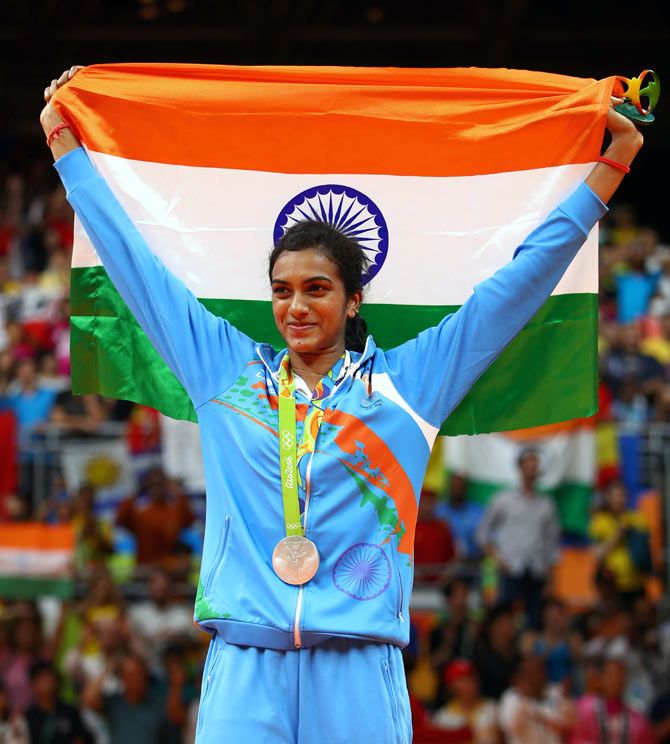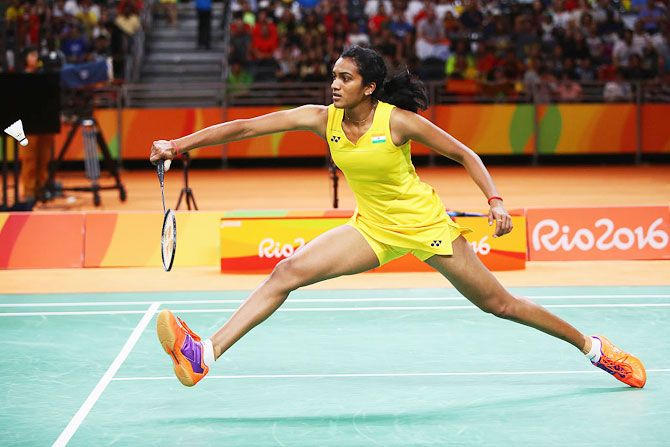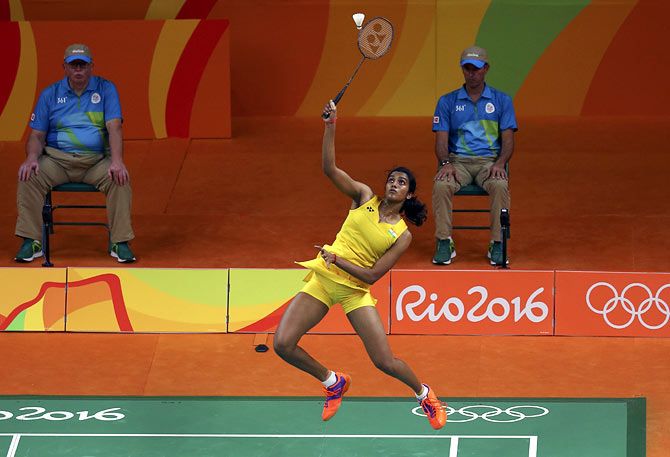'Before the start of the Olympics I did not think I would make it to the final and win a medal.'
'I just thought of going there and giving my best, taking one match at a time.'
P V Sindhu tells Rediff.com's Harish Kotian what went into her silver medal win at the Rio Olympics.

The first Indian woman to win an individual silver medal at the Olympics, P V Sindhu saved India the blushes at the Rio Games just when all hope was lost.
With Sakshi Malik clinching a surprise bronze in wrestling, the Hyderabad girl provided India a rare moment to celebrate courtesy her women's singles badminton silver medal in her first appearance at an Olympics.
The 21 year old, who already had two bronze medals from the World Championships, is today the darling of the nation.
Rewind a year ago and she was not even sure of taking part in the Games because of a fractured foot which kept her off the badminton court for nearly three months.
Her determination, coupled with the support and intense training sessions from coach P Gopichand and her physio C Kiran, saw her make a spectacular comeback, something Gopichand calls "divine intervention" and "humanly impossible".
Rediff.com's Harish Kotian caught up with Sindhu at an event hosted by Olympic Gold Quest in Mumbai, where she was felicitated by sporting legends, Viswanathan Anand and Geet Sethi.
If someone had told you at the start of the Rio Olympics that you would finish with a silver medal would you have believed it?
No, I would not have believed. Before the start of the Olympics I did not even think I would make it to the final and win a medal.
I just thought of going there and giving my best, taking one match at a time. I always believed in myself and my coach also believed in me.
We just took it one match at a time and we made it all the way to the final and ended up with a silver medal.
I think, from now on, the responsibilities will grow and everybody will look towards me, so I need to work harder.
I feel this is just the beginning and there is a lot more to come.

How tough was the competition in Rio? You had to overcome quite a few top players -- Wang Yihan and Nozomi Okuhara -- en route the final.
From the first round it was very tough. I never started the tournament thinking that any match would be easy, even in the group stages.
Starting from my first match against Li Michelle till Carolina Marin in the final, all the matches were really tough.
I took it one match at a time and Gopi Sir kept motivating me.
He never put any pressure on me. He used to tell me it is my first Olympics and I should not take any additional pressure.
For each match we worked hard and planned according to the opponent strategy wise. Everything worked perfectly.
Your journey to the Olympics was not easy. With a year to go for the Games your leg was in a cast following a fracture. How did you feel back then? Was there the fear that you could miss the Olympics?
When I was injured I really felt bad. It took time to come back. But after I made a comeback, my physios and my trainers supported me a lot. Even OGQ helped me a lot.
With God's grace I managed a good recovery and was able to make a good comeback to badminton.
I had a great team around me, which helped and I was able to bounce back after such a tough time.
Gopi Sir kept motivating me all the time. He used to say, 'No problem, you will come back' and we started our training after my recovery.
And when the qualification for the Olympics came, we had 2 to 3 months. We started working hard. Everything went on well and we managed to execute our plans perfectly.
Did you sleep the night before the final? How did you stay focused? India was egging you on to win gold.
Even my aim was to win the gold medal. I always believed in myself that I could do it.
In any match, be it an Olympic final or any other game, one has to win and one has to lose. So that day Carolina was the one who managed to win; she played really well. It was anybody's game and that day it was her day.
It was my first Olympics and before the final I was just thinking that I just should play my game and give my best. That is what I did.

What went wrong in the final?
I was well prepared and it was all going on well. But I made a couple of mistakes and then she took the lead and maintained that in the same way.
Maybe, if at that moment, I had changed something and tried something different, who knows...
The shuttles were also a little bit fast, and I tried to control them, but I was hitting wide.
Maybe if I had controlled them, the game would have been a bit different.
We saw a very aggressive Sindhu during the Olympics. Was it something you worked on ahead of the Games?
I believe that aggression should always be there on your face because every point is important in such a big tournament.
You should be alert for every point because once you take it easy, or get a bit relaxed, you might lose many points in a flow.
I feel aggression is very important. At the same time you need to maintain your focus as well.
You also seemed to have worked on the jump smash, a rarity for female players in badminton.
I recently started playing that jump smash; it was before the Rio Olympics. I tried in the past, but because of my height I could just stand and hit.
In Rio, the jump smash proved to be very helpful for me and I really loved playing the shot.
In the past, even though I used to love it, I never tried it. Then one day me and Gopi Sir decided to work on the shot.
Initially, it was a bit tough, as all my smashes were going into the net, because my jump was not proper and also the point of contact was not proper.
But later on, with some practice, I was able to play it well and use my height and jump to good effect.
The first thing Gopichand said after you won the silver medal at Rio was that he would give your mobile phone back. You are someone who uses the mobile phone a lot when not in practice. How difficult was it to stay away from your phone?
It was not very difficult. I feel if you want to achieve something big, you have to sacrifice a few things.
I didn't feel that if I give up my mobile phone I would be in trouble or something; it was okay for me.
When the coach asked me for it I immediately gave up my phone because I knew what it was for.
After the Olympics I did get my phone back, so it was not a problem for me.
Every athlete dreams of winning an Olympic medal and my dream was also that.
So there were many sacrifices along the way, but you cannot say it was a sacrifice. If you want to achieve something you have to give up a few things.
For me, it was really important to maintain my diet and that is the case for every athlete.

Saina Nehwal suffered an unfortunate injury during the Olympics and bowed out in the group stages. But her bronze medal at the London Olympics must have played a part in inspiring your medal hopes in Rio.
Yes, she performed really well in the last Olympics. For the women in our country and the sport of badminton it was a great moment because she won a medal at the Olympics.
It was great motivation for many of us.
Do you think it will be possible to see you and Saina play the gold medal match in Tokyo?
It would be really great if that happens because it will mean two Indians will definitely get a medal at the Olympics.
I feel it is very important to take it step by step for me. I am looking at the next few tournaments.
I have a few Super Series coming along in the next few months and I am focussed on those for the moment.
OGQ has been supporting you since you were 15. What difference has signing up with OGQ made to your career?
OGQ has been of great help since I signed up when I was 15 years old. They have been really very supportive.
They always keep asking me if I want anything to get better. Whatever I asked for was provided immediately.
Everything was perfect from their end, as far as the support was concerned, and I am really very thankful to them.
Even if I had everything, they would still come and ask if I needed anything more. So it was great to know that someone was backing you so much and doing everything possible for you.
They were the first to recognise my potential and support me when I needed it most at the time of starting out. They are my first sponsors.
After I joined them I won my first senior international title in the Maldives in 2011 and the journey started.











